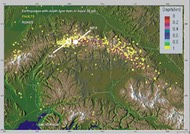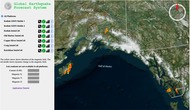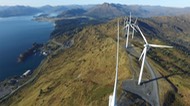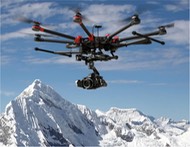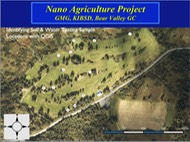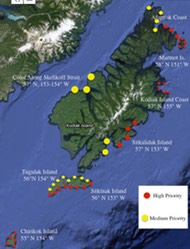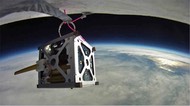Trillium Learning’s A World Bridge™ Projects currently focus on smarter community themes, helping to design and build sharable models on the NASA World Wind Geospatial 4D platform for:
– Renewable Wind Energy – design, cost, material, as-built construction, operations and maintenance data, along with lessons learned. Everything needed for any City/community to establish their own energy-generating wind turbines!
– Water Purification and Treatment – monitoring and research techniques for assuring a city has safe water
– Food/Agricultural Systems Development – accelerated greenhouse farming techniques
– Resource Mapping and Inspection – full visual coverage for a city, and structure or environment evaluation, with all data student generate, using UAVs and accessible spatial data analysis tools
…and many more issues related to this global initiative, listed below.
Link to the A World Bridge – CitySmart-WorldWise NASA Europa Challenge Site
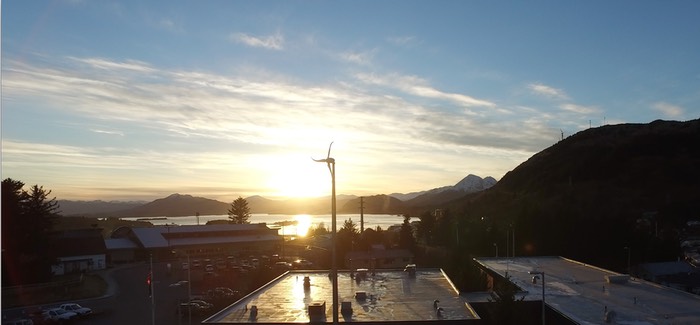
Wind Turbine at Kodiak High School
Partners include: NASA, Open GeoSpatial Consortium, Kodiak Electric Association, UMass at Amherst, City of Springfield, Oregon, and multiple international cities.
The development of a Smart Cities Spatial Information Framework is based on these themes:
- Smarter Cities are high-density generators of innovation.
- Geospatial information is a major enabler of Smart City technology benefits.
- Infrastructure management is vital to urban resilience.
- Open standards are needed for interoperability, efficiency, application innovation and cost effectiveness.
Being a Smart City has become the mantra for how cities can ensure a sustainable future. The “Geo for All” initiative, with the OpenCitySmart Thematic, http://wiki.osgeo.org/wiki/Opencitysmart, is being established to facilitate coordinated development of OpenCitySmart applications.
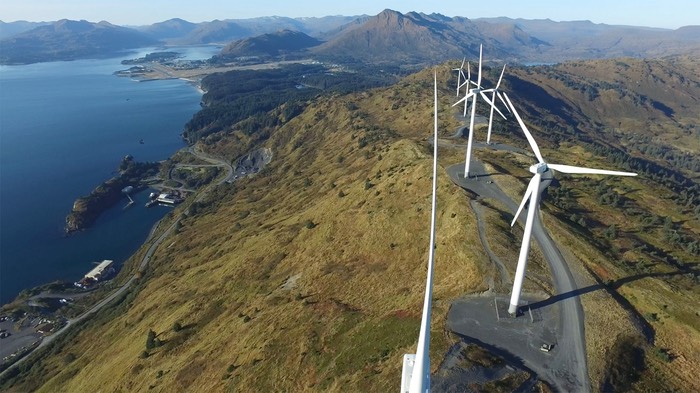
Kodiak Electric Association Wind Farm
The world is shrinking. We are actually getting larger in it, and the cities have to absorb today’s exponential increase in population, including the continual movement of rural life to urban living. World population since the ‘second industrial’ revolution after 1850s has grown from 1 billion to almost 8 billion today. In 1950 at a mere 2.5 billion, we were almost evenly distributed between rural and urban. Today, in the developed world, approximately 80% of the population lives in cities.
This is creating very difficult conditions for sustainability, for managing basic city services and for ensuring the quality of urban life for everyone. We must learn to apply our limited resources more effectively and more efficiently. To most wisely achieve this goal, we need a more collective approach to problem-solving. Many, if not most of the challenges facing the cities of today are quite similar in nature, if not identical, from infrastructure management to essential public services. Why must each city solve these problems alone? If the cities of the world were to share solutions with each other, they could each focus on different parts of the problem and thereby only bear the burden for a small fraction of the load. And by working together we may come to better appreciate what we share in common as well as experience the joy being able to help each other.
Quality of Urban Life starts with the individual and the community feeling empowered, to some reasonable degree, that they control their destiny. Circumstances that engender happy families come from a variety of essential yet intangible things, such as decent living conditions, high quality education for children, competitive job opportunities for adults and excellent public services, amongst a variety of other community-oriented urban life qualities. If we start with the basics, the things that all cities need to manage urban infrastructure, we can come up with a very simple suite of solutions all cities need. If we had a common platform to share these solutions, we would have a recipe for cities of the world to work together in each other’s interest, while serving their own. A ‘Smart City’ solution for one city serves most every other city. It is time we provide the seed crystal for that common platform. NASA has virtual globe technology, https://worldwind.arc.nasa.gov/, that can well serve as the visualization interface (a.k.a., common platform) for a world of functionalities eminently sharable between cities. It is time we stopped competing purely for profit and began challenging each other to collectively advance the Quality of Urban Life.
This project includes participation in the development of a unifying, open virtual globe platform, OpenCitySmart. Based on existing open solutions, we will seed this CitySmart platform with an initial suite of functionalities that include tools for managing highly localized renewable energy and power grid, including hydro, wind and solar, based on the success stories of municipalities in northern Italy, and Alaska. We will include functionalities for managing input of LiDAR data and city infrastructure. This will be in concert with municipalities around the world, including, Springfield, Oregon, Como Italy, Melbourne Australia, and Anchorage-Kodiak-Ketchikan, Alaska. This project utilizes collaboration with all World Bridge projects and from interested city partners.
To encourage innovative ideas for implementing novel networking strategies, we believe the Commons-Based Peer Production, CBPP (per Schweik and English, 2012) is a novel way to approach a global, transdisciplinary collaboration. As Yochai Benker (2013:1) states: “[Commons-based] peer-production is the most significant organizational innovation that has emerged from Internet-mediated social practice. Organizationally, it combines three core characteristics: (a) decentralization of conception of problems and solutions, (b) harnessing diverse motivations, and (c) separation of governance and management from property and contract.” Benkler (2005) recognized open source software projects as the “quintessential instance” of CBPP. Using the CBPP approach, we will establish a collaboration between cities of the world to effectively address urban management issues via a single open platform that cities of the world can share as part of their commons.
This project includes participation in a NASA G4A RDA SmartCity Challenge for CitySmart teams to develop innovative smart city applications on the NASA WebWorldWind platform (https://worldwind.arc.nasa.gov/) using the CBPP approach.
